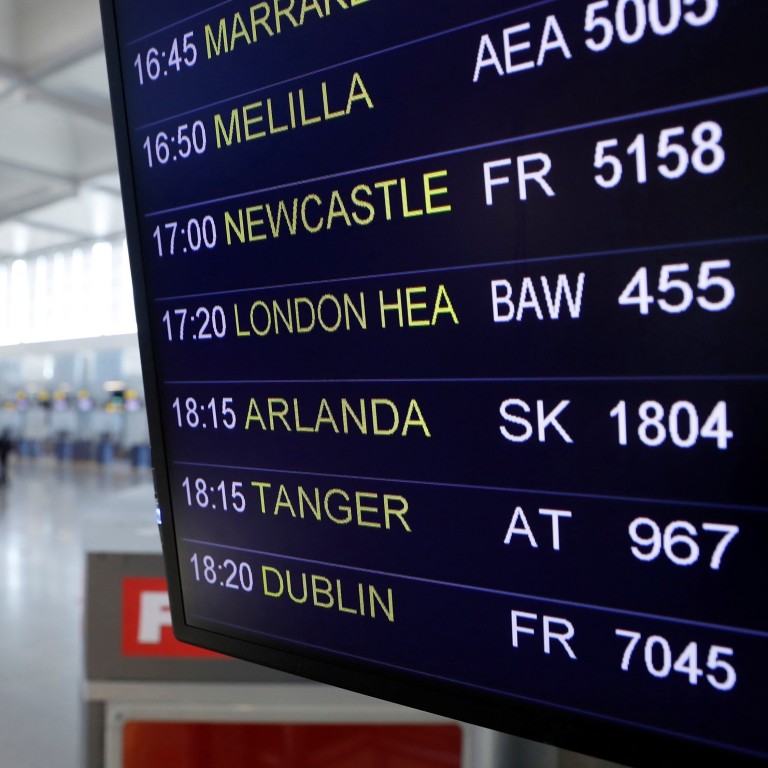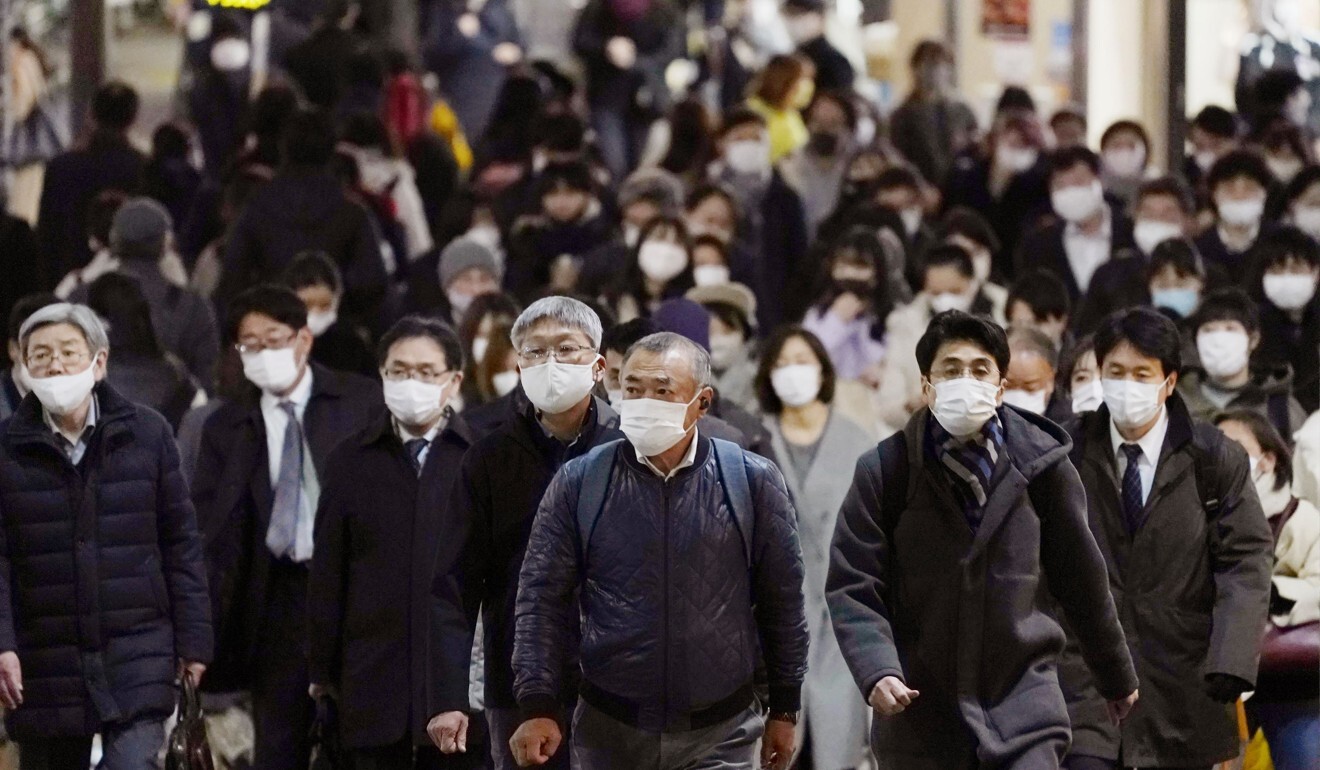
Coronavirus latest: Japan, South Korea, Philippines and Singapore restrict travel from UK
- Hong Kong, India and Pakistan have also restricted travel from the UK due to the new strain of coronavirus discovered there
- Meanwhile, Sydney on Wednesday eased lockdown restrictions for Christmas after Australia’s largest city reported a reduction in new cases
Japan will ban the entry of non-Japanese people from the UK beginning on Thursday, Chief Cabinet Secretary Katsunobu Kato told a news conference on Wednesday.
South Korea will temporarily suspend flights from the United Kingdom until the end of December over fears of a new strain of the coronavirus.
The Philippines suspended all flights from the UK, according to a resolution issued by the government’s task force handling the pandemic. The country will also bar travellers who have been in the UK in the 14 days prior to arrival in the Philippines, the task force said. Those arriving before December 24 and have been to the UK shall be required to undergo strict quarantine and testing protocols, the resolution said.
Singapore on Tuesday announced tighter restrictions. All long-term pass holders and short-term visitors with recent travel history to the United Kingdom within the last 14 days will not be allowed to transit through or enter Singapore.
Singapore citizens and permanent residents returning from the UK will be required to undergo a Covid-19 polymerase chain reaction test upon arrival, at the start of their 14-day stay-home notice.
Hong Kong, India and Pakistan have also restricted travel from the UK.
SYDNEY LOCKDOWN EASED
Amid a record testing and tracing effort, just eight new cases were recorded in the past 24 hours, prompting authorities to announce all residents could have at least some visitors over to celebrate the festive period.
“Everybody has had a very difficult year,” said state Premier Gladys Berejiklian, announcing the “modest” three-day easing of restrictions.
Berejiklian said most Sydneysiders would be allowed to invite 10 adults to their homes, with that number limited to five in the neighbourhoods at the epicentre of the outbreak.
She said the relaxing of rules was possible because of the low number of new cases – 16 in the past 48 hours – and because most have been linked to known infections.
New coronavirus strain found in England as London faces tighter rules
The eased restrictions stand in stark contrast to many places in Europe and elsewhere, which have been forced to tighten lockdown and travel rules as the virus’ spread accelerates.
The cluster of cases in Sydney’s northern beaches now stands at just under 100, after a prolonged period of no community transmission.
The outbreak has seen the normally bustling city centre empty, and residents flocking to testing sites in record numbers.
“I’ve been so buoyed by the way the community has responded to what we’ve asked them to do,” said Berejiklian. “The testing numbers have been so pleasing. The way in which the northern beaches community, in particular, has responded has been so positive.”
MALAYSIA TO SECURE MORE VACCINES
The Southeast Asian nation is spending about US$500 million to buy enough vaccines to inoculate 26.5 million people, or 82.8 per cent of its people.
It has already bought vaccines from Pfizer and Britain’s AstraZeneca and expects to secure more from Chinese and Russian manufacturers, as well as from its participation in the global Covax facility, backed by the World Health Organization (WHO).
The government had increased its vaccine supply targets to take into account risks that some vaccines may not be approved by regulators or if manufacturers failed to deliver, Science, Technology and Innovation Minister Khairy Jamaluddin told reporters.
Coronavirus: Malaysia reaches vaccine deal with AstraZeneca
In addition to the talks with Russia’s Gamaleya Institute, the developer of the Sputnik V Vaccine, Malaysia is also in discussions with Chinese manufacturers Sinovac Biotech Ltd and CanSino Biologics to purchase their vaccines.
The deals with the Chinese and Russian manufacturers will include cooperation with Malaysian companies to carry out fill-and-finish work, Khairy said.
Malaysia has also secured 6.4 million doses of AstraZeneca’s vaccine through Covax, doubling the amount it had already agreed to purchase from the drugmaker.
The government is also in negotiations with Pfizer on an option to increase its purchase of vaccines to cover another 20 per cent of its population, Khairy added. Malaysia has purchased 12.8 million doses of the Pfizer vaccine so far, with the first shipment expected to arrive in February.
Malaysia’s religious authorities have decided that the coronavirus vaccine is allowed and is mandatory for some groups, Religious Affairs Minister Zulkifli Mohamad Al-Bakri said in a statement.
This view has been relayed to the Council of Rulers, he said on Wednesday, amid concern among local Muslims that the shots could contain substances forbidden by Islam.
The Special Muzakarah Committee of the National Council for Malaysian Islamic Affairs, which met on December 3, is of the opinion that the vaccine must be administered to groups identified by the government, Zulkifli said.
“As such, I urge all Malaysians, especially Muslims, to abide by and give full trust to the government to manage the Covid-19 pandemic through the use of vaccines,” he said.
Vaccines will save 2021? Not so fast, here’s what the experts think
SOUTH KOREA’S CASES, DEATHS SPIKE AGAIN
The figures released by the Korea Disease Control and Prevention Agency on Wednesday brought the national caseload to 52,550, with more than 13,130 cases added in the last two weeks alone.
Seventeen Covid-19 patients died in the past 24 hours, bringing the death toll to 739 as concerns grow about a shortage in intensive care beds. At least 284 of the country’s 15,085 active patients were in serious or critical condition.
The spread of the virus is now mainly in the densely populated capital region, and health workers are struggling mightily to track infections occurring just about everywhere, including hospitals, long-term care facilities and army units.
The government has restored some social distancing restrictions in recent weeks and will clamp down on private social gatherings of five or more people between Christmas Eve and January 3. Restaurants could be fined if they accept large groups, ski resorts and national parks will be closed, and hotels cannot sell more than 50 per cent of their rooms during the period.

JAPAN INFECTIONS HIT RECORD
The capital reported 748 new cases of the novel coronavirus the same day, the second-highest daily increase on record.
Tokyo has rewritten its record for each day of the week for the past nine consecutive days, bringing its cumulative total to 53,130.
Its tally of new infections for December has already surpassed 12,000, an all-time high for any month on record. The previous high of 9,857 cases was logged in November.
The nationwide tally, which topped 200,000 on Monday, now stands at around 207,600. The overall death toll surpassed 3,000 on Tuesday.
How Singapore went from Covid-19 hero to zero, and back to hero again
SINGAPORE AIRLINES LAUNCHES VACCINE APP
Singapore’s national airline is testing what it calls “a new digital health verification process,” which will allow passengers to present their coronavirus testing and vaccination status on their mobile or smart phones during travel.
Singapore Airlines said the scheme, which is debuting on Wednesday on flights to the city state from Jakarta and Kuala Lumpur, is “the first in the world.”
The related app “will offer customers the ability to securely store and present information related to Covid-19 tests, as well as their vaccination status in the future.”
While passengers can provide paper certification of a negative coronavirus test, the new process enables airline staff and Singaporean immigration officials “to verify the authenticity of these certificates” and “ensure that the customers meet Singapore’s entry requirements.”
Additional reporting by Associated Press, Bloomberg, DPA and Kyodo

